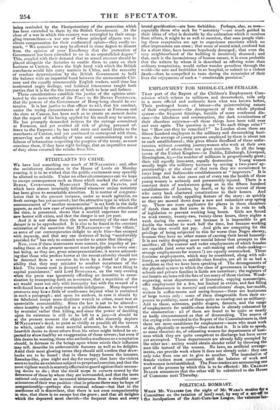STIMULANTS TO CRIME.
Wu have had something too much of NPNAUGHTEN ; and, after the satisfactory discussion in the House of Lords on Monday evening, it is to be wished that the public excitement may speedily be allowed to subside. Under no other circumstances can we hope to escape consequences such as those which marked the crimes of BURKE, COURVOISIER, MARGARET MOTES, and FRANCIS, and which have almost invariably followed whenever undue notoriety has been given to remarkable atrocities. It is matter of congratu- lation that in the present instance, under so much agitation, no fresh outrage has yet occurred ; but the attractive type in which the announcement of "another monomaniac" is set forth in the daily papers, as each new case of suspicion, generated by the stimulus of the time, is presented, shows that a morbid eagerness for some new horror still exists, and that the danger is not yet past.
And it is not alone from the mere notoriety of the case that danger is to be apprehended. It is also to be found in the constant reiteration of the assertion that MNAUGHTEN-or "the villain," as some of our contemporaries delight to style him—has escaped with impunity, and that any one desirous of being "comfortably provided for" has only to commit murder to attain that blessing! Now, even if these statements were correct, the impolicy of pa- rading them at the present moment must be palpable to every one : but being, as they are, gross misrepresentations, it seems astound- ing that those who profess horror at the recent calamity should not be deterred from a recourse to them by a dread of the pos- sibility that they may minister to another occurrence of the kind. The insane man is doomed to undergo "the next thing to capital punishment," said Lord BROUGHAM, on the very evening when the press was ignorantly affording an incentive to assas- sination by trumpeting forth an assurance, that a repetition of the act would meet not only with immunity but with the reward of a well-found home a id every reasonable indulgence. Many depraved creatures may knee little of madhouses beyond what is contained in such a paragraph ; and upon its authors, in case it should by its falsehood tempt some destitute wretch to crime, must rest an unenviable accountability. Since the law is not to be altered— since insanity is still regarded as a pitiable disease, to be treated by restraint rather than killing, and since the power of deciding upon its existence is still to be left to a jury—it should be at the present moment the object of all who sincerely deplore M‘NAUGHTEN'S deed, to paint as vividly as possible all the terrors to which, under the most merciful sentence, he is doomed. A heartfelt desire to deter others from his crime might indeed be ex- pected to show itself by an exaggeration of those terrors ; but even if this desire be wanting, those who set forth a madhouse as a temptation should, in fairness to the beings upon whose minds their influence may tell, describe its unfavourable features as well as its delights. Amid their most glowing terms they should still confess that draw- backs are to be found : that in these happy homes the inmates, Basselas-like, pine night and day for escape ; that here the violent seem to loathe an existence subject to perpetual coercion, and that the most vigilant watch is scarcely effect ual to guard against their unceas- mg desire to die ; that the timid mope in corners scared by the fierceness of those by whom they aressurrounded, and that the more rational only endure an increased bitterness from a dreadful con- sciousness of their true position : that in prisons there may be hope of companionship—perhaps also eventual release—but that in the madhouse all is discordant, that there is not even companionship in vice, that there is no escape but the grave ; and that all delights which the depraved most cherish—the frequent dram and every
brutal gratification—are here forbidden. Perhaps, also, as men— especially those who seek for "notoriety "—are much guided in their ideas of what is desirable by the estimation which it receives from others, it might be as well to mention, that sane people visit- ing these receptacles are apt to experience emotions which no after-impressions can erase; that some of sound mind, confined but for a short time, have become hopelessly deranged; that even the very neighbourhood of the building is intuitively shunned ; and that, such is the inconsistency of human nature, it is even probable that the writers by whom it is described as offering more than ordinary temptations, would rather wander penniless through the world—lie sore and bedridden in an hospital, or submit to a violent death—than be compelled to taste during the remainder of their lives the enjoyments of such a "comfortable provision."


























 Previous page
Previous page